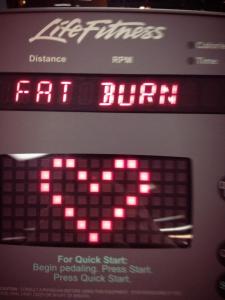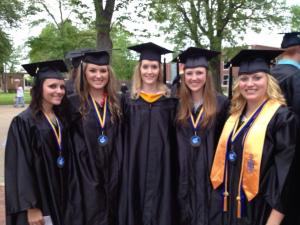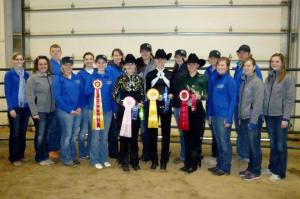With the recent, saddening news of the Kansas State NCAA Equestrian team being terminated, a lot of discussion has been stirred up in the equine world regarding the future of the entire collegiate equestrian program itself. This hits at home for me, as some of my fondest memories and greatest successes must give credit to a collegiate equestrian program. I am sure that this can be said for any competitive college rider, but I found my place was Northeastern Oklahoma A&M College. Please enjoy 10 lessons the team not only instilled in me through a passion, but that life has consistently reminded me of.
1. You are only as strong as your weakest rider.
As being part of a competitive Intercollegiate Horse Show Association region, we competed against several schools in our area and at each show our team would choose point riders for each division. In a sense, we were playing a hand of poker. Our coach did not inform us who exactly these individuals were so we were constantly continuing to work hard in hopes to help carry the team. But, importance also came from those in the same class that were not held responsible for the point rider. If the top ranks in each class were taken by others not given the label, this would hurt that rider’s status as the lower that they placed, the less points they received. With this in mind, the point riders were not held in a limelight to work harder or gain more attention, everyone was pushed to do their best to highlight the team as a whole.
2. Save it for the van.
Competition can sometimes bring out frustrations, especially if it didn’t go quite like you had planned. Often times you may not agree with how a judge placed a class or how a horse rode. Human instinct, is to vent frustrations….but at a busy horse show this is almost impossible as you never know who might be within earshot or in a bathroom stall as you are subconsciously expelling your frustrations. To save our team the embarrassment of ever saying something that we shouldn’t, we incorporated an honor system in which we only vented to each other, in the privacy of our vans on the way home. But more importantly beyond that, this is a great lesson that we should all be so thankful for learning from our coach as we can instill this in a day to day basis. In Chelsie Huseman’s words, “It’s so tempting to publicly slander someone that has burdened you but it does nothing good for you, or others.” This is said to be true in any walk of life, not just in a horse show scenario.
3. Ride or die.
Because our team had goals of winning and competing head to head with the top teams in the region, we had an attendance policy in place to ensure that all members of the team worked as hard as everyone else between competitions. After all, if you were not committed to put in the hard work then you were not going to ride in place in someone that had. With this being said, if you were not sick, dying, or knew someone that was dying then you were expected to be in attendance of all practices, meeting, workouts, and team events. But on the flip side, there is another viewpoint on this common phrase that was contributed to the back of team t-shirts by an outgoing teammate. This viewpoint is basically the idea that as a rider, you must put your ‘all’ into each practice to get the most of every second spent in the saddle in order to keep improving yourself.
4. Let the horse take care of you.
One of the IHSA’s claims to fame is that during each show, the rider is to draw a horse and showcase their skills without the ability to warm the horse up and learn their quirks or ‘buttons’. A brief warm-up may be witnessed prior to each show to see each and every individual horse go through their paces and a small description is given, but other than that you are on your own. This tests the skill of a rider to be able to skillfully maneuver unfamiliar horses in rail work and in a pattern. But at the end of the day when all the nerves have built before your class, the best thing to do is to take a deep breath and simply let the horse do what it does best. You can’t control the unknown, but you can certainly do what you have always done and not what you will shall never do.
5. Stay fit.
At first the thought of 6 am weekly team workouts and monitored individual workouts sounded like a horrible idea, but we were soon reminded that being actively fit and strengthening regional and core muscles would not only improve our health, but also strengthen our riding. Kudos to our coach for putting up with our moaning and groaning as our sore, achy muscles were constantly screaming at us between all the riding, working out, and even up the steps to the dorms. But in the grand scheme of things, making a habit of being physically fit sure payed off as we rode our way to the top and were able to squeeze into our fitted shirts and show chaps! 😉
6. It’s ok to be a guinea pig.
I am proud to say that I was a member of the NEO Equestrian team during the very first season of competition. This meant that we were in a sense, tested on to determine how efficient the team rules and schedules were and tried out team practice horses. In no way, shape, or form was this a bad thing. We certainly feel that we created a legacy that we hope will live on and leave a mark on the small school we all have moved on from and no that it will only continue to grow.
7. Use it or lose it.
The long hours of practice, hours at the gym, and many hours spent in the saddle outside of practice on my own, resulted in a muscle memory of a correct leg position. To gain this position without serious concentration and physical readjustment after transitions, was quite the accomplishment for me. Luckily, I am now in a industry that allows me to continue to use and refresh this skill on a weekly basis so I can continue to ride and find my correct position. But, many of my students now find that revisiting horseback riding activities is indeed harder than riding a bike and the constant nag of their instructor regarding their leg continues to find the commentary on a week to week basis. This can be said about many things, we must continue to sharpen the skills that we have worked so hard to finesse in order to not lose them to the wayside.
8. Make friends for a lifetime.
Not only did the team atmosphere require attendance for team goals, but also for us to get to know one another and work as a team. With so many hours together, it was no surprise that we soon became a family in a sense. Leaving practice was not the end of our associations, we would often head over to the cafeteria to eat dinner together, and then even back to the dorms for study sessions. It may have not been all about what we learned during our time there, but also who we met. Some of my very best friends were the teammates I made while on the team.
9. Be aware of your surroundings.
With busy team practices, full show classes, and crowded show facilities, we were constantly taught to plan ahead whether it was to avoid horses colliding into one another or to not miss our draw for our class. By also competing in the large mid-west region, we found ourselves traveling across 2 states at times to get to shows. This meant we traveled as a group and looked out for another in this crazy world, where danger seems to be lurking around every corner.
10. Hard work pays off.
In the end, the hours of commitment and hard work continued to pay off. Sure a team ribbon was always the goal at the shows, but even more importantly were the individual strengths gained throughout the season. Our main intentions were not only to do well, but to also obtain a degree during our time there, and hopefully see each other again while working in the industry.
All in all, I am so thankful to have been a part of such a great program and would not trade any of my experiences for the world. I certainly owe my individual success at this point in time to the dedicated coach that we had, Chelsie Huseman, I know that I am certainly not the only collegiate rider that owes many great successes to this sport and I hope that we will all come together as a team, as a family, and as fellow equestrians to see that the great programs throughout the United States will continue to prosper.





